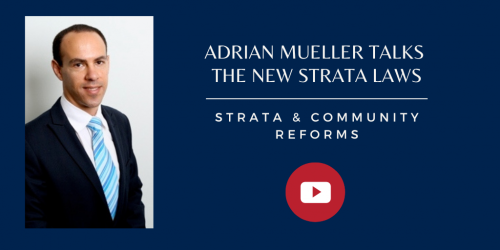In August of this year the criminal jurisdiction of the District Court of New South Wales handed down the last of a series of decisions in relation to the penalties to be imposed on a strata scheme, strata manager and lot owner respectively, arising from a death which had occurred following a damaged gate in an industrial strata scheme falling on a person.
Although these decisions focus upon the criminal prosecution brought against the strata scheme strata manager and lot owner by Safe Work NSW, the circumstances are illustrative for owners corporations and strata managers generally.
Background Incidents
The strata scheme in question was an 8 lot industrial strata scheme around which was built a perimeter fence including a custom-built sliding electric gate. The gate included guide posts and an end stopper to prevent the gate from over travelling in the closing direction. The gate was approximately 8.5 metres long and 2 metres high.
In June 2020 an incident occurred whereby the gate was impacted at high speed by a van. Although the gate remained upright it was bent out of shape, partially pulled off its track and disconnected from its electric motor. In addition, the guide posts for the gate were damaged and the stopper had come out of position and was no longer capable of preventing over travel of the gate. Whilst NSW Emergency Services attended the site immediately following the collision, and took steps to secure the gate and perimeter fence, no additional steps were taken to repair, replace or make it safe.
On 5 June 2020 a member of the owners corporation contacted the strata manager to advise of the damage to the gate. Between 5 and 12 June 2020 the gate was opened and closed manually by various workers at the site.
On the morning of 5 June 2020 a representative of the strata manager issued a work order to a contractor to repair the damage, but did not arrange for the gate to be repaired or replaced as a matter of urgency. In contrast, damage to the water meter at the owners corporation was repaired on 5 June 2020 on an urgent basis.
Neither the owners corporation nor the strata manager arranged for a risk assessment to be conducted in relation to the damaged gate nor was the gate placed out of service following the damage nor was it removed and nor was a sign posted to the effect that the gate was not operational pending its full repair or replacement. Neither the owners corporation nor the strata manager took any action to prevent the manual operation of the gate or to post signs advising the gate was not to be operated manually until it had been fully repaired or replaced.
The following day, a number of occupants within the strata scheme undertook makeshift repairs to the gate, without notifying the strata manager. These repairs were ad hoc in nature and did not eliminate or otherwise address the risk of the gate falling or collapsing.
Approximately one week later an employee of one of the businesses operating from the strata scheme and attempted to operate the gate manually but in the circumstances including a lack of a physical stopper and the damaged guide posts the gate became unstable and fell onto that person. The worker sustained fatal crush injuries as a result of the incident. The business was also prosecuted by Safe Work NSW as a result of the injury and death suffered by one of its employees.
Criminal Case Against the Owners Corporation
The owners corporation accepted that it had failed in its duty to comply under the Work Health and Safety Legislation in that it did not:
- either itself or require the strata manager to arrange an immediate risk assessment in relation to the safety and security issues;
- take the gate out of service immediately and post signage to the effect that the gate was not to be operated manually until it was fully repaired or replaced;
- implement itself or require the strata manager to implement measure to keep persons away from the damaged gate;
- direct that the damaged gate not be touched or remain open or unlocked pending repair or replacement; and
- develop and implement a safe work method statement for the manual operation of the gate.
The owners corporation was ordered to pay a fine of $225,000.00 as well as the prosecutor’s costs of $40,000.00.
Criminal Case Against the Strata Manager
The following failures were identified as a managerial breach of the strata manager’s breach of duty under the Work Health and Safety Legislation in that the strata manager’s duties included:
- requiring a competent person to repair or replace the damaged gate following notification on 5 June 2020 of the damage to that gate;
- arranging for the damaged gate to be immediately taken out of service and to prevent it being manually operated until repairs and replacement of the gate had been completed;
- communicating to owners and occupants of the owners corporation by means such as signs and barricades that the damaged gate should not be operated unless and until the operation of the gate had been deemed to be safe by a competent person; and
- confirming and follow up with relevant competent persons to require timeframes for repair and replacement once the strata manager had been notified by the owners corporation of the damage to the gate.
The strata manager was ordered to pay a fine of $150,000.00 as well as the prosecutor’s costs.
Criminal Case Against the Business
The following failures were identified as a breach of the business’ failure to comply with its duty under the Work Health and Safety Legislation:
- failing to direct its workers not to manually operate the gate whilst it was damaged;
- failing to direct that the damaged gate remain open unlocked prior to its replacement or repair by a competent person;
- failing to implement and develop a safe system of work for operating and/or using the damaged gate during the period prior to its replacement or repair;
- failing to develop a safe work method statement or safe work procedure for the manual operation of the gate;
- failing to train and instruct its workers in a safe system of work and work method statement;
- failing to raise safety concerns with the owners corporation and/or with the appointed strata manager about the daily routine of workers manually operating the damaged gate.
The business was fined $375,000.00 and was ordered to pay the prosecutor’s costs in the amount of $44,000.00.
Some Relevant Observations for Owners Corporations and Strata Managers
Each of the parties prosecuted, the lot owners, the owners corporation and the strata manager were identified as having failed to have taken steps which each of them could have done to avoid the death.
Importantly, the Court identified that these steps could have been taken with little or no burden placed on the party concerned. Examples of the steps which could have been taken included:
- the lot owner directing its employees not to operate the gate manually;
- the owners corporation directing that all occupants of the strata scheme do not operate the gate manually;
- the owners corporation taking steps to make sure the gate was “out of action” until such time as it had been repaired;
- the owners corporation directing owners and occupants of the strata scheme that they did not have permission or authority to repair common property;
- the strata manager failing to implement a safe work plan in relation to the damaged gate, once they became aware that the gate had been damaged;
- the strata manager failing to pursue the clearly required repairs and/or replacement of the gate with sufficient urgency;
Conclusion
Failures of common property are more than an annoyance. The failure of an owners corporation and strata manager (and in some instances lot owners) to address failures of common property can lead to tragic outcomes.
It is critical that owners corporation take seriously their responsibilities pursuant to s106 of the Strata Schemes Management Act 2015 to repair and maintain common property, and these cases illustrate that it is insufficient for owners corporations and strata managers to operate on the assumption that repairs and maintenance can occur “in due course”. In each instance, a proper analysis needs to be undertaken of the potential impact of each failure of common property and each instance where common property needs to be repaired.
If an owners corporation or strata manager is in any doubt in relation to these matters they should seek advice immediately.

Warwick van Ede I BEc LLM I Lawyer
Since 1990, Warwick has specialised in strata law, property law and litigation. Recognised for his expertise, he is also a NSW Law Society Accredited Specialist in Property Law. In 2021 he was selected to serve on the Property Law Committee of the Law Society of NSW. Profile I LinkedIn
Contact Us
For all strata law advice including by-laws, building defects and levy collections contact our specialist NSW and Sydney strata lawyers here or call 02 9562 1266, we’re happy to assist.





